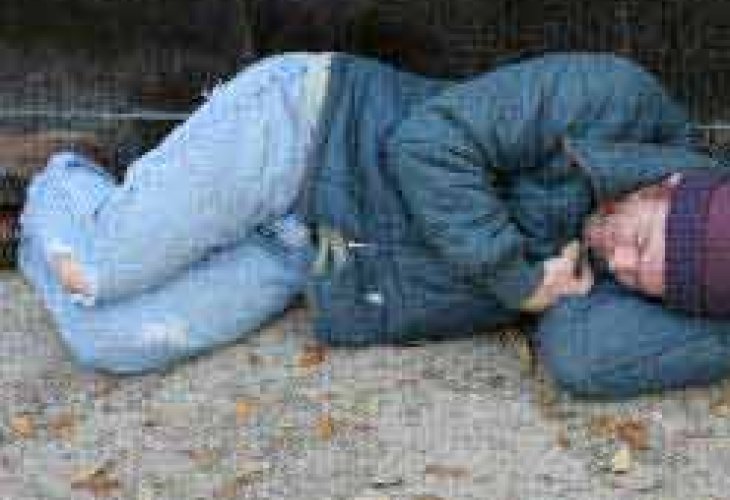Personal Stories
Meeting the Homeless Man Who Changed How I See Life
A personal encounter led to deep reflection on life's fragility, faith and the true meaning of shelter
- S. Gutfreund
- |Updated

"I know what you think when you see me," a homeless man told us one cold night in the city. He had once been a student at the same campus where we studied. “But you should know I was exactly like you not long ago. I went to classes, had friends, a normal life. But I didn’t use what I had. I didn’t want to face life on its terms.”
He rolled up the sleeve of his worn-out shirt and showed us the deep lines of pain carved into his arm. We were in a park in the heart of the city, surrounded by piles of trash and fading daylight. He opened the hot meal we brought him while we looked away, unable to meet his eyes. Our breath floated in the cold air, and a silent question hung between us.
Why are you still here? Why aren’t you trying to change your life?
I was thinking it. I’m pretty sure my friends were, too. But none of us said a word. I shifted on my feet and tried to stay warm. We had only been outside for half an hour, and already the chill had found its way under my coat and gloves.
He had nothing but a light jacket and newspaper-stuffed pants. I tried to picture him just a few years earlier walking across campus with a backpack, heading back to his warm dorm room. What happened between then and now?
Almost as if he sensed my thoughts, he finished his soup, looked me straight in the eye, and said, “You know, it’s not so bad. After a few months, you get used to it. People can get used to anything.” He gave a small shrug and smiled. Then he asked, “Do you have any more meals? I can show you where my friends are, they live down at the other end of the park.”
“It Won’t Happen to Me”
That meeting stayed with me. At first, I was frustrated with him. I felt he wasn’t taking responsibility or trying hard enough to improve his situation. But later, I began to ask myself are the homeless really so different from us?
How often do we see someone suffering and quickly think, “That won’t happen to me”? Rabbi Noah Weinberg used to teach that whenever we hear about someone else’s difficult life situation, we should ask ourselves: What can I learn from this? If someone you know goes through a divorce, think about your own marriage. What can you do to strengthen it? What mistakes can you avoid?
A few weeks ago, we were stuck in heavy traffic on the way back from vacation. We didn’t know why we had stopped, but after a while, ambulances passed us, one after another. Then we understood: there had been a serious accident up ahead. People got out of their cars, stretched, smoked, and waited. Just before the traffic jam, I had commented on how dangerously people were driving, tailgating, swerving, speeding to save maybe 20 minutes.
When we finally drove past the scene, it was horrific. Shattered glass, crushed cars, blood on the road. A fatal crash. And yet just three minutes later I saw a car with a full family inside try to pass a truck on a narrow curve. What was that father thinking? I knew exactly what he was thinking: “It won’t happen to me.”
But it can happen to any of us. That’s what I learned that winter night in the park.
We’re All More Fragile Than We Think
Our lives are more fragile than we like to admit. We try not to think about how quickly things can change, but the truth is, most of our circumstances are not in our control. From the moment we are born, we are handed a long list of things we didn’t choose such as our parents, our appearance, our health, our economic background, even our natural strengths and weaknesses. And that list only grows as we get older.
But one thing always remains in our hands: what we do with what we’ve been given.
Do we choose to believe in Hashem and move forward, even when things are hard? Or do we let bitterness and frustration take over? Do we choose to live with truth and purpose, or do we settle for excuses that sound reasonable until someone else, with less, does more?
What do we do with what we’ve learned? What do we do after completing something meaningful? What happens to the inspiration from a powerful prayer, a moving Rosh Hashanah moment, or the deep reflection of Yom Kippur? Do we carry that into our lives or leave it behind as the holiday ends?
The Sukkah: A Shelter of the Soul
This is exactly what the mitzvah of Sukkot gives us. Right after Yom Kippur, we are asked to build something, a Sukkah that captures the closeness we felt during the High Holidays. It’s a time to take all that inspiration, all that spiritual energy, and turn it into action.
The Sukkah reminds us that our real home is not made of bricks and steel. It's the shelter of the soul, the strength and light we build inside ourselves.
Its walls are fragile, open to the wind. But within that space, we create something lasting. We use the tools Hashem gave us like our hearts, our minds, our courage to shape a home that holds meaning. And sitting beneath the stars, we remember: we don’t control everything in life. But we do control who we become.
In a way, we’re all homeless until we use what we’ve been given to build a lasting shelter inside, one that holds the light of Torah, of growth, and of connection to something greater than ourselves.

